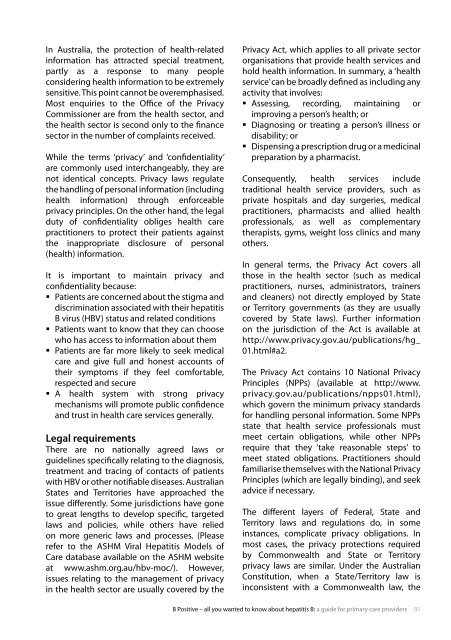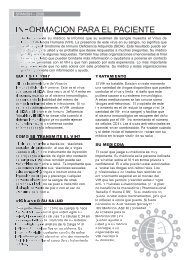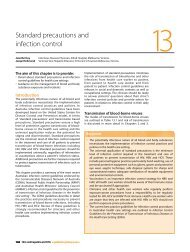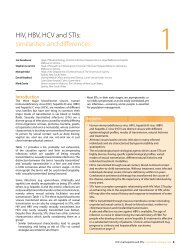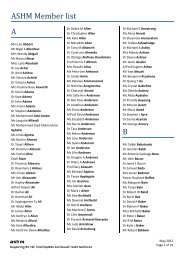B Positive – all you wanted to know about - ASHM
B Positive – all you wanted to know about - ASHM
B Positive – all you wanted to know about - ASHM
You also want an ePaper? Increase the reach of your titles
YUMPU automatically turns print PDFs into web optimized ePapers that Google loves.
in australia, the protection of health-related<br />
information has attracted special treatment,<br />
partly as a response <strong>to</strong> many people<br />
considering health information <strong>to</strong> be extremely<br />
sensitive. this point cannot be overemphasised.<br />
Most enquiries <strong>to</strong> the office of the Privacy<br />
commissioner are from the health sec<strong>to</strong>r, and<br />
the health sec<strong>to</strong>r is second only <strong>to</strong> the finance<br />
sec<strong>to</strong>r in the number of complaints received.<br />
While the terms ‘privacy’ and ‘confidentiality’<br />
are commonly used interchangeably, they are<br />
not identical concepts. Privacy laws regulate<br />
the handling of personal information (including<br />
health information) through enforceable<br />
privacy principles. on the other hand, the legal<br />
duty of confidentiality obliges health care<br />
practitioners <strong>to</strong> protect their patients against<br />
the inappropriate disclosure of personal<br />
(health) information.<br />
it is important <strong>to</strong> maintain privacy and<br />
confidentiality because:<br />
� Patients are concerned <strong>about</strong> the stigma and<br />
discrimination associated with their hepatitis<br />
b virus (HbV) status and related conditions<br />
� Patients want <strong>to</strong> <strong>know</strong> that they can choose<br />
who has access <strong>to</strong> information <strong>about</strong> them<br />
� Patients are far more likely <strong>to</strong> seek medical<br />
care and give full and honest accounts of<br />
their symp<strong>to</strong>ms if they feel comfortable,<br />
respected and secure<br />
� a health system with strong privacy<br />
mechanisms will promote public confidence<br />
and trust in health care services gener<strong>all</strong>y.<br />
Legal requirements<br />
there are no nation<strong>all</strong>y agreed laws or<br />
guidelines specific<strong>all</strong>y relating <strong>to</strong> the diagnosis,<br />
treatment and tracing of contacts of patients<br />
with HbV or other notifiable diseases. australian<br />
states and terri<strong>to</strong>ries have approached the<br />
issue differently. some jurisdictions have gone<br />
<strong>to</strong> great lengths <strong>to</strong> develop specific, targeted<br />
laws and policies, while others have relied<br />
on more generic laws and processes. (Please<br />
refer <strong>to</strong> the asHM Viral Hepatitis Models of<br />
care database available on the asHM website<br />
at www.ashm.org.au/hbv-moc/). However,<br />
issues relating <strong>to</strong> the management of privacy<br />
in the health sec<strong>to</strong>r are usu<strong>all</strong>y covered by the<br />
Privacy act, which applies <strong>to</strong> <strong>all</strong> private sec<strong>to</strong>r<br />
organisations that provide health services and<br />
hold health information. in summary, a ‘health<br />
service’ can be broadly defined as including any<br />
activity that involves:<br />
� assessing, recording, maintaining or<br />
improving a person’s health; or<br />
� diagnosing or treating a person’s illness or<br />
disability; or<br />
� dispensing a prescription drug or a medicinal<br />
preparation by a pharmacist.<br />
consequently, health services include<br />
traditional health service providers, such as<br />
private hospitals and day surgeries, medical<br />
practitioners, pharmacists and <strong>all</strong>ied health<br />
professionals, as well as complementary<br />
therapists, gyms, weight loss clinics and many<br />
others.<br />
in general terms, the Privacy act covers <strong>all</strong><br />
those in the health sec<strong>to</strong>r (such as medical<br />
practitioners, nurses, administra<strong>to</strong>rs, trainers<br />
and cleaners) not directly employed by state<br />
or terri<strong>to</strong>ry governments (as they are usu<strong>all</strong>y<br />
covered by state laws). further information<br />
on the jurisdiction of the act is available at<br />
http://www.privacy.gov.au/publications/hg_<br />
01.html#a2.<br />
the Privacy act contains 10 national Privacy<br />
Principles (nPPs) (available at http://www.<br />
privacy.gov.au/publications/npps01.html),<br />
which govern the minimum privacy standards<br />
for handling personal information. some nPPs<br />
state that health service professionals must<br />
meet certain obligations, while other nPPs<br />
require that they ‘take reasonable steps’ <strong>to</strong><br />
meet stated obligations. Practitioners should<br />
familiarise themselves with the national Privacy<br />
Principles (which are leg<strong>all</strong>y binding), and seek<br />
advice if necessary.<br />
the different layers of federal, state and<br />
terri<strong>to</strong>ry laws and regulations do, in some<br />
instances, complicate privacy obligations. in<br />
most cases, the privacy protections required<br />
by commonwealth and state or terri<strong>to</strong>ry<br />
privacy laws are similar. under the australian<br />
constitution, when a state/terri<strong>to</strong>ry law is<br />
inconsistent with a commonwealth law, the<br />
b <strong>Positive</strong> <strong>–</strong> <strong>all</strong> <strong>you</strong> <strong>wanted</strong> <strong>to</strong> <strong>know</strong> <strong>about</strong> hepatitis b: a guide for primary care providers 91


